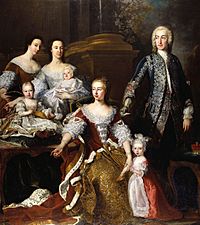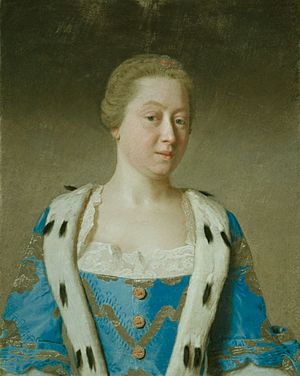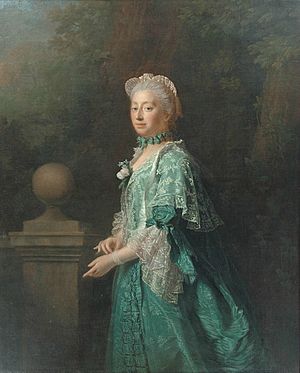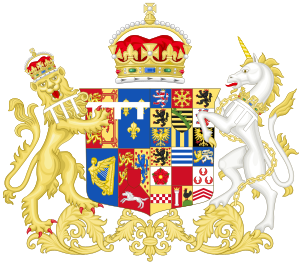Princess Augusta of Saxe-Gotha facts for kids
Quick facts for kids Augusta of Saxe-Gotha-Altenburg |
|
|---|---|
| Princess of Wales | |
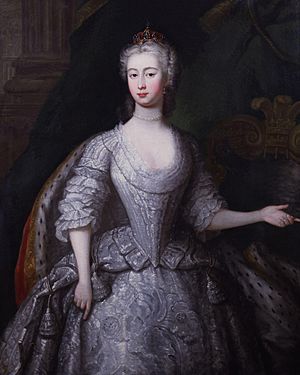
Portrait by Charles Philips, 1736
|
|
| Born | 30 November 1719 Gotha, Duchy of Saxe-Gotha-Altenburg |
| Died | 8 February 1772 (aged 52) Carlton House, London, England |
| Burial | 15 February 1772 Westminster Abbey |
| Spouse | |
| Issue |
|
| House | Saxe-Gotha-Altenburg |
| Father | Frederick II, Duke of Saxe-Gotha-Altenburg |
| Mother | Princess Magdalena Augusta of Anhalt-Zerbst |
Augusta of Saxe-Gotha-Altenburg (born November 30, 1719 – died February 8, 1772) was a German princess. She became the Princess of Wales when she married Frederick, Prince of Wales. Frederick was the oldest son of King George II and was next in line to the throne.
Augusta never became queen because Frederick died before his father in 1751. Her oldest son, George III, became king in 1760 after his grandfather, George II, passed away. After her husband died, Augusta was expected to rule Britain as a regent if her son became king while still a child. This role lasted until her son turned 18 in 1756.
Contents
Augusta's Early Life and Marriage
Princess Augusta was born in Gotha, a city in Germany. Her parents were Frederick II, Duke of Saxe-Gotha-Altenburg and Magdalena Augusta of Anhalt-Zerbst.
In 1736, it was suggested that Augusta marry Frederick, Prince of Wales. He was 29 years old and the son of George II of Great Britain. Originally, Frederick was supposed to marry a princess from Prussia. This marriage would have created a strong alliance between Britain and Prussia. However, the two kings could not agree on which of their children would marry whom.
Around this time, there were rumors that Frederick might marry another woman. To prevent this, Queen Caroline quickly suggested that Frederick marry Augusta. King George II visited Saxe-Gotha and agreed that Augusta was a good choice. Frederick said he would marry anyone his father chose. He hoped this marriage would help him get more money from Parliament.
Augusta did not speak French or English. Her mother thought it was not necessary for her to learn before the wedding. The British royal family was from Germany, so they spoke German. Augusta arrived in Britain speaking almost no English. Her wedding took place very soon after, on May 8, 1736, in London.
Life as Princess of Wales
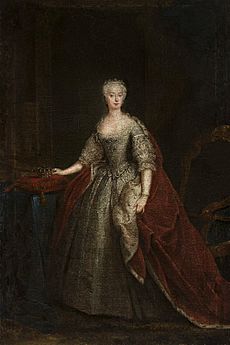
Augusta arrived in Greenwich on April 25, 1736. Her future husband, Frederick, welcomed her. On April 27, she was taken to St James's Palace in London. There, she met the rest of the royal family. She made a good first impression by bowing deeply to the King and Queen. The wedding ceremony followed shortly after.
During her first year of marriage, Augusta was still very young. She was sometimes seen playing with her doll in the windows of her home. Her sister-in-law, Princess Caroline, eventually told her to stop. Frederick and Augusta had nine children together. Their last child was born after Frederick had passed away.
Frederick did not want his wife to influence him, unlike his father. He also told Augusta to act against his parents' wishes. For example, he told her to arrive at church after the Queen. This would force Augusta to walk in front of the Queen to reach her seat. The Queen eventually made Augusta use a different entrance. Frederick then told Augusta not to enter the chapel if the Queen was already there.
When Augusta became pregnant for the first time, the Queen wanted to be present at the birth. She wanted to make sure the baby was truly Augusta's. Augusta's first daughter, Princess Augusta of Great Britain, was born on July 31, 1737. Frederick made Augusta travel while she was in labor. He wanted to prevent his parents from being at the birth. The palace was not ready, and Augusta had to give birth on a tablecloth.
This difficult birth caused a big argument between Frederick and Augusta and the King and Queen. They did not make up until 1745, during a rebellion. After they made peace, Augusta and Frederick became more involved in high society. Augusta was seen as pretty, elegant, and a kind host. Sometimes, her children would perform plays for their guests.
Augusta as a Widow and Mother
On March 31, 1751, Frederick died unexpectedly. Augusta became a widow. She was the mother of eight children and was expecting her ninth. She was very upset but also careful to protect her husband's reputation. She burned his private papers to keep them secret.
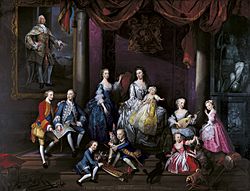
The King did not show much emotion when his son died. Augusta told him that she and her children were now under his care. The King was touched by her situation and promised to help them. After Frederick's death, Augusta's role became more important. She was now the mother of the future king. The King and Parliament named her as a possible regent. This meant she would rule if the King died while her son was still a child.
For the rest of King George II's reign, Augusta lived quietly with her children. She focused on raising them. When she did appear in public, the King gave her the same honors as the Queen. The public and the court also respected her.
However, Augusta became less popular as a widow. Some people criticized how she raised her children. She kept them away from the outside world. They rarely met people outside their family. After her husband died, she was greatly influenced by John Stuart, 3rd Earl of Bute. He was her son's tutor.
When her oldest son became an adult, the King tried to arrange a marriage for him. The King wanted him to marry a princess from Brunswick or Prussia. But Augusta preferred a princess from her own family, the House of Saxe-Gotha.
On October 25, 1760, her son became King George III. The next year, he married Charlotte of Mecklenburg-Strelitz. Augusta and Charlotte did not have a good relationship. Augusta made it hard for Charlotte to make friends at court. She also chose many of Charlotte's staff. These staff members were thought to report back to Augusta about Charlotte.
Augusta had a strong political influence on her son, King George III. He trusted her advice. She was also influenced by Lord Bute. He became prime minister in 1762 with her support. His appointment caused many problems. Both Augusta and Bute faced strong public anger. Bute had to resign the next year.
In 1765, King George III had a temporary illness. Augusta and Lord Bute kept this a secret from Queen Charlotte. A new law was made that said Charlotte would become regent if the King could not rule. Augusta was suggested as regent, but many people opposed this. They worried that Lord Bute would have too much power if Augusta became regent.
Augusta was reportedly unhappy about her younger sons' marriages. They married without her permission.
Augusta died from throat cancer at the age of 52. She passed away at Carlton House.
Augusta's Legacy: Kew Gardens
Princess Augusta greatly expanded and improved Kew Gardens after her husband's death. Sir William Chambers built several beautiful structures in the gardens for her. One of these, the tall Great Pagoda, was built in 1761 and is still there today.
Her Children
| Name | Birth | Death | Notes |
|---|---|---|---|
| Princess Augusta, Duchess of Brunswick | 31 July 1737 | 23 March 1813 | Married, 1764, Charles William Ferdinand, Duke of Brunswick-Wolfenbüttel; had children. |
| George III | 4 June 1738 | 29 January 1820 | Married, 1761, Charlotte of Mecklenburg-Strelitz; had children. |
| Prince Edward, Duke of York | 25 March 1739 | 17 September 1767 | Died at age twenty-eight, unmarried. |
| Princess Elizabeth | 10 January 1741 | 4 September 1759 | Died at age eighteen, unmarried. |
| Prince William Henry, Duke of Gloucester | 25 November 1743 | 25 August 1805 | Married, 1766, Maria, Countess Waldegrave; had children. |
| Prince Henry, Duke of Cumberland | 7 November 1745 | 18 September 1790 | Married, 1771, Anne Luttrell; no children. |
| Princess Louisa | 19 March 1749 | 13 May 1768 | Died at age nineteen, unmarried. |
| Prince Frederick | 13 May 1750 | 29 December 1765 | Died at age fifteen, unmarried. |
| Caroline Matilda, Queen of Denmark and Norway | 11 July 1751 | 10 May 1775 | Married, 1766, Christian VII, King of Denmark and Norway; had children. |
Places Named After Augusta
Several places in British North America were named to honor Princess Augusta:
See also
 In Spanish: Augusta de Sajonia-Gotha para niños
In Spanish: Augusta de Sajonia-Gotha para niños


